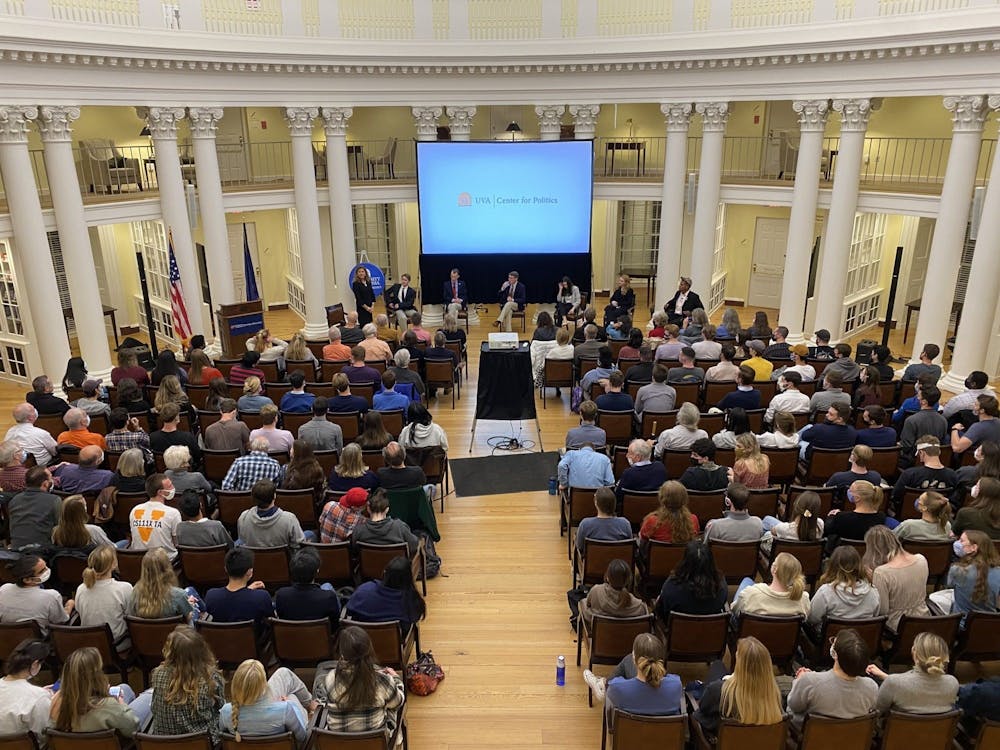Following the success of the Common Grounds documentary released last November, a group of Center for Politics interns are again aiming to demonstrate the power of individuals with diverse political views coming together and sharing their views. To do so, the interns have issued the Common Grounds challenge — tasking high schools and universities throughout the country with organizing roundtable conversations amongst students.
In the fall, Center for Politics interns created the documentary “Common Grounds” to display the heightened political climate between political parties that has plagued American politics and led to dangerous events in recent years, such as the attack on the U.S. Capitol and the “Unite the Right” rally in August 2017.
The project concluded with a showing of the 30-minute documentary when it first came out Nov. 11 in the Rotunda Dome Room. Around 1,000 people watched the documentary that night, with 250 in-person attendees and 750 virtual viewers.
Now, the project team has issued a challenge to schools within Virginia and beyond. Beginning this month, the challenge asks all high school or college students in teams of eight or less to watch the documentary, conduct a group discussion and create their own community art project based on what they learned. Each team can then share their project on Twitter by tweeting @center4politics, using #HASHITOUT or by sending an email with pictures to the Center for Politics team.
The challenge is being publicized through social media and by interns and Center for Politics staff reaching out to institutions of education throughout the country. So far, a handful of high schools — including James River High School in Midlothian, Virginia — are in the process of organizing their own Common Grounds discussion to complete the challenge.
In the past few years, political polarization has dramatically worsened, affecting local, state and national governments. Jesse Shapiro, professor of political economy at Brown University, conducted a study released Jan. 20 that found affective polarization in the US has increased more dramatically since the late 1970s than in the eight other countries they examined — the U.K., Canada, Australia, New Zealand, Germany, Switzerland, Norway and Sweden.
College campuses aren’t spared from increasing political polarization, and University students are worried that increasing polarization eliminates the possibility to openly discuss current events or political issues with fellow classmates.
“Political polarization has essentially closed the gap for positive discussion and therefore, any opportunity for certain groups to listen to outsider perspectives,” third-year College student Ashley Ban said.
Third-year College student Victoria Kim believes that political polarization on college campuses distorts a central component of unity among a student body.
“Political polarization is bad because it creates irreparable division amongst the student body which is meant to be united in order to function properly,” Kim said in an email to The Cavalier Daily.
The five interns that began the project in Feb. 2021 were in charge of producing the entirety of the documentary — the role of the faculty was only to supervise and help problem-solve when needed. During production of the documentary — which took approximately nine months to complete — Glenn Crossman, director of programs at the Center for Politics, supervised and provided support to the student interns as they crafted the film.
“Whenever they felt they were up against a challenge they could not conquer, they just needed a boost and to know that someone had their back,” Crossman said.
Molly Hayes, third-year College student and intern at the Center for Politics, discussed what the group hopes to achieve in issuing this challenge.
“We hope to inspire other young people to have what can be difficult and scary conversations with people they disagree with,” Hayes said. “On a larger scale, we hope that such conversations can help make the next generation of politics more productive.”
Similarly, Raed Gilliam, Center for Poltiics intern and fourth-year College student, similarly said that the documentary was about collaborating together with people from different political backgrounds and making something together.
“The documentary was our way of doing the same thing — people with different political leanings making a film about politics together,” Gilliam said.
Crossman said that he and others at the Center for Politics have been diligently reaching out to politics programs at colleges and universities across the country and that a few national organizations have come forward to take on the challenge. No names of organizations have been announced yet, but they are in the works.
Learning how to produce the film proved a challenge, Crossman said. Unexpected inclement weather, technical difficulties and trouble finding subjects made the team have to constantly adjust as filming went on.
“One of the student producers experienced pushback from friends for wanting to dialogue with ‘the other side’ but that simply created a learning opportunity for everyone involved and it all worked out well in the final production,” Crossman said.
In regards to whether or not the documentary as a whole was successful, Hayes commented on the positivity from the participants who did speak.
“One thing that went right in the documentary was thanks to our participants-- everyone we asked was enthusiastic about engaging in a group discussion which made for really interesting dialogue,” Hayes remarked.
There is currently no initiative to create a follow-up documentary or film on the results of the national challenge.
Gilliam said that the group expects to be flexible about the due date as more and more schools show interest. Interested participants can find information via the project’s social media link on Instagram at commongrounds_uva.







